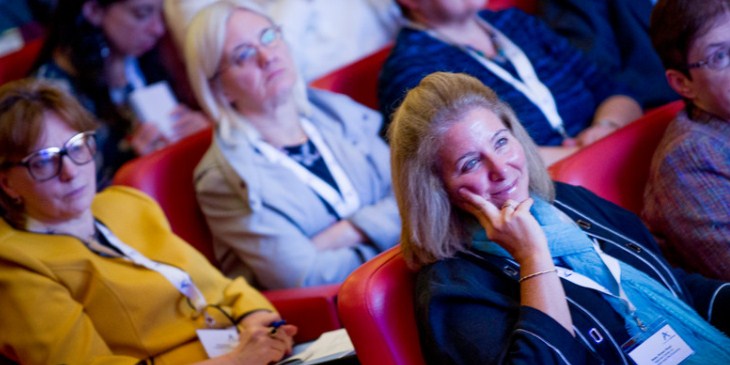16 October 2014

An international education used to be the preserve of a wealthy elite, but it is now something that parents the world over want for their children, a major conference has heard.
More than 140 experts from across the globe met for a lively and constructive clash of ideas at the seventh biennial Cambridge Assessment Conference, International Education: Interpretation, Importance and Impact.
Cambridge Assessment Group Chief Executive Simon Lebus opened the day of discussion by saying that if a similar event had been staged 25 years ago it would have been unlikely to attract much interest, but globalisation, technology and the spread of the English language had seen an ‘international education’ rise up the agenda of governments and become expected by parents around the world.
Throughout the day the conference welcomed participants from India, South Africa, Argentina and Mexico via video link and Mr Lebus’ views were echoed by delegates who joined live from Egypt, saying international education was the “system of choice” for thousands of parents. Dr Omneya Kassabgy, Managing Director at the British School of Egypt, said that “as the world becomes increasingly connected, international education is recognised as a key driver of future prosperity”.
A fascinating overview of the economic drivers behind the growth of international education was provided by David Smith, the Sunday Times’ Economics Editor. He said that countries around the world viewed education as one of the most obvious routes out of the global financial crisis. “Education is very important now in the globalisation story and I don’t see any prospect of that going into reverse,” he said.
The conference then heard from Marc S. Tucker, a leader in the movement for standards-based school reform in the United States. The President and Chief Executive Officer of the National Center on Education and the Economy said that America had “paced the rest of the world in attainment” from the 1850s right through to the 1970s, being arguably the first country to provide universal primary and secondary school education. But he said attainment growth ground to a halt in the 1970s, despite substantial investment in education. He said the US needed to pursue a new educational model, based on top-performing countries.
“Cambridge-style education is the wave of the future,” he said. “Not just for a small minority of schools that are going to train a nation’s leaders. Countries will survive and prosper only if they provide for almost all their kids a kind and quality of education that up to now they have provided only to their elites.”
In her presentation, Isabel Nisbet, former Regional Director of Education, South East Asia, for Cambridge International Examinations, asked whether education could be both national and international. Ms Nisbet, the Executive Director of the newly formed A Level Content Advisory Board, said that she felt that the two should sit alongside in an interactive relationship.
Delegates went to lunch with a host of ideas to debate, and returned in the afternoon to a presentation from educators including Stephen Spurr, former Head Master of Westminster School. Dr Spurr, who is Managing Director Europe of Reddam House group - an expanding network of high-performing schools in South Africa and Australia - said it was sobering to see how advanced pupils in high-performing jurisdictions were compared to their counterparts in the UK. He called for a “creative fusion” of Socratic and Confucian approaches to learning.
The audience was then given an insight into how an international education could become available to all, with a presentation by Dino Varkey, Group Executive Director at the GEMS Education Group. He said there was no reason to fear private sector involvement in international education, saying it could respond much more quickly to growing demand – providing a good education for as little as three dollars a month in some parts of India.
“We don’t have time to engage in the traditional intellectual and political debates of public versus private that seem to occupy so much time and resource in the developed world,” he said.
The day’s discussions and presentations culminated in a lively ‘Big Debate’ from the floor, chaired by presenter Sian Jones, before Tim Oates, Group Director of Assessment Research and Development, provided the closing remarks. He said that, while he was not going to attempt to summarise a day which was so full of ideas, it had shown that “very complex relations and forces play out in complex ways”.
“However, it’s a truism just to say ‘it’s complex’ and so often conferences and discussion reach that conclusion,” he said. “Today we’ve gone beyond simply saying that - we’ve said we can examine how that complexity plays out in different circumstance, how historical processes are unfolding, and that’s important”.
Delegates and speakers then retired to continue the debate over refreshments. And true to the spirit of such an international debate, the discussion continued long after on social media under #CAconf.